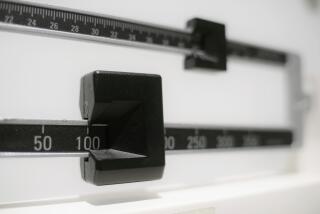It comes down to satisfaction
- Share via
This just in: The high-protein Atkins diet tops the charts as far as weight loss is concerned, according to a yearlong study from Stanford University School of Medicine. The study, published last week in the Journal of the American Medical Assn., compared the Atkins program with three others (Zone, Ornish and the LEARN diet, which follows the government’s food pyramid) that are heavier on carbs.
After one year, those on Atkins lost an average of 10.4 pounds, compared with 5.7 pounds on LEARN, 4.8 on Ornish and 3.5 on Zone.
This isn’t the first time high-protein diets have come out ahead in weight-loss studies, leading researchers to believe that protein-rich foods have an edge over carbohydrates in making someone feel full and satisfied, leading to more fat-shedding success. Yes, complex carbs such as fruits and vegetables are essential for a balanced diet, but protein, experts say, might be key to dropping pounds.
Exactly how that happens is still being studied, but most appetite and weight-loss researchers think it has to do with the release of hormones that affect satiety, the satisfied feeling of having eaten enough. “When we eat a high-protein diet, we suppress the hormones telling the brain we’re hungry and increase the secretion of hormones that tell the brain we’re full,” says Dr. Zhaoping Li, director of clinical research at the UCLA Center for Human Nutrition.
One study suggesting the importance of protein was published in 2005 in the Journal of Clinical Endocrinology & Metabolism. Scientists fed 57 overweight men and women diets that were high in protein and low in fat, or standard amounts of protein and high fat. The results, during a 16-week, fixed-meal plan that was monitored via food records: Those on the high-protein plan wanted less to eat.
Another 2005 study published in the American Journal of Clinical Nutrition also linked a high-protein diet (versus a low-protein diet) to higher levels of satiety, measured via appetite questionnaires. During one phase of the four-month study, participants ate a 30% protein diet and were told to eat as much of the pre-prepared foods as they wanted, and to stop eating when full. Food and appetite logs were analyzed, and uneaten food was returned, so that researchers could measure what types of foods were eaten and how many calories were consumed. Mean calories decreased by 441 compared with weeks when they were eating a lower protein diet.
Protein consumption could affect one or more of several hormones that are known to govern satiety. For example, Li says, consuming protein is known to increase the levels of a gut hormone called peptide YY, which acts to dampen appetite. Other appetite-dampening hormones that may be involved are leptin (made in fat cells) as well as glucagon-like peptide-1 and cholecystokinin, made in the gut.
But hormones may not be the whole story. Important, too, may be how the body processes protein, says Wayne Campbell, associate professor of foods and nutrition at Purdue University in West Lafayette, Ind. “If you eat a diet high in protein, you’re going to have to expend more calories to utilize that protein, and cumulatively those differences ... helps someone achieve weight loss,” he says.
Eating adequate amounts of protein also helps preserve lean body mass, Li says. “If you go on a diet that’s [high in carbohydrates], you’re going to lose muscle,” she says. Muscle burns more calories than fat, so losing muscle will give a person a slower metabolism -- which makes it harder to lose weight.
Success in the Stanford study may have been achieved for less physiologically complex reasons too, says Dr. Randall Stafford, one of the study’s authors and associate professor of medicine at the Stanford Prevention Research Center. “The Atkins diet has the simplest message to follow -- avoid simple carbohydrates,” he says. “That message is contained within the other three diets, but gets diluted by the fact that the participants are trying to follow numerous parameters at the same time.”
Although the Atkins restrictions may be easier to abide by, they may ultimately cause a dieter’s downfall: The Atkins group regained more weight in the second half of the Stanford study compared with those on other diets. Stafford wonders if there’s an innate need to eat certain foods that makes Atkins hard to stick with long term or if a world filled with carbs (chips, cake, pie, more) is to blame.
“We’re surrounded by an obesigenic environment in terms of food and the options people have for physical activity,” he says. “Given that overwhelming environment, I tend to think that it’s more that we’re surrounded by foods that don’t fit.”
*






